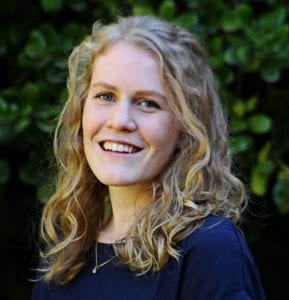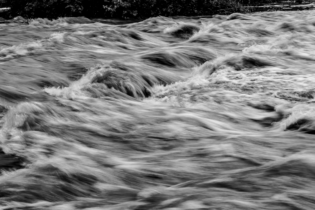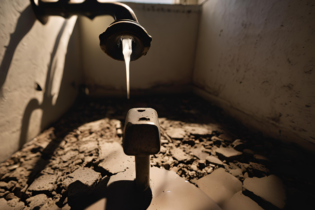
Anya Eilers, YWP WC branch chairperson
magazine interviews
Anya Eilers, Young Water Professionals Western Cape branch chairperson:
- What are your current professional activities?
I am currently completing the final stages of my Master’s in hydrogeology at the University of Stellenbosch. I have also had the privilege of serving as the vice-chairperson of the Young Water Professionals (YWP) Western Cape branch for 2016, and as chair for 2017.
September marks a new adventure in my life as I will be moving to Ethiopia to start an internship at the Global Green Growth Institute, in the water sector under the policies division. As their branch in Addis Ababa is one of their oldest and most active, it will be an exciting opportunity to contribute to their Climate Resilient Green Economy project, as well as to collaborate with the partnering organisations, the Water Research Institute and the International Water Management Institute. I have no doubt that it will open up many other doors in the international water sector.
- As a ten-year-old, what did you want to be when you grew up’?
I always wanted to be an environmentalist. I loved animals and the nature (I got this from my mother) and just wanted to work as a nature conservationist or vet.
My mother always tells the story of when I was a child and we were camping in the Cederberg. I was a particularly dramatic and confident six year old, and when I discovered a leaking tap in the bathroom, I was distraught because of all the water being wasted. I wanted my mother to fix it or call the manager so that I could talk to him. I must have already realised then that water is precious.
- What has your journey as a water sector professional been to date?
My journey in the water sector is still a relatively new one, but with every step I take I fall more in love. My honours research took me across the Karoo where we completed a groundwater study as a prelude to the shale gas fracking. I presented this research at the YWP-ZA conference in Pretoria, 2015, and I was hooked. Water had always seemed like just a science but I marvelled at a new world full of innovation and inter-disciplinary collaboration.
- What personal strength have assisted you in your career trajectory?
My tenacity (which can also sometimes be a weakness) has been a saving grace. The last few years have been a huge struggle, both personally and professionally, and I so often wanted to give up and just go teach English overseas or do something completely different. However, my tenacity and stubbornness pulled me through it, and looking back, I now know what I want more than ever.
- What drives you day-to-day?
My first cup of coffee in the morning! But after that, it’s the simple joys in life. I have my dreams and goals, but on an ordinary, boring day, I get my strength from making a friend laugh, learning something new, engaging with someone completely different to myself, or just going for a run in the mountains (we are very lucky in the Western Cape). I have Max Ehrmann’s poem “Desiderata” pinned on my wall, and always refer back to the closing line:
With all its sham, drudgery and broken dreams, it is still a beautiful world. Be cheerful. Strive to be happy.
- How do you balance work-personal commitments?
I use Morgan Scott Peck’s principle of ‘delayed gratification’: I try and do the things that I least want to do first, so that I procrastinate less and spend the rest of the day doing the work that I love, and still have time for myself.
- Now that you are working, what tip would you give your ten-year old self?
I don’t think that I would give any tips to my ten-year old self. I am far from perfect and could have made a thousand better choices, but I still wouldn’t have wished it any other way.
- What inspires you about the water sector?
Water is the key to sustainability, to the economy, to healthy living, to life, to absolutely everything. It is the one thing we cannot live without. What is more inspiring than that?
- What are the main challenges for implementing water and sanitation for all?
Huge social inequities still exist in South Africa, and these are often magnified in the sanitation sector. How can we implement efficient and sustainable sanitation and water practices when the elite in South Africa are not living by the same principles? I personally think that water-based sanitation is a technology of the past and unsustainable for South Africa, but changing this would require rebuilding the foundations of our country. That is a very daunting task.
- How are women’s experiences in the water sector different from men’s?
The hydrogeological sector continues to be largely dominated by men. I still sometimes experience negative reactions to a woman completing field work and driving a 4×4 bakkie.
However, in general it is getting better. I think a big challenge often lies with women asserting their authority. They will have the skills and qualifications to back them but their gender may prevent them from getting the respect they deserve.
- How do women need to be supported in the water sector?
One of the best ways is for other women to be a shining example. Nothing has encouraged and indirectly supported me more than watching other strong women successfully and elegantly assert their presence in a male dominated sector. It is a reminder that with enough patience and strength of spirit, anything is possible.
- What role has YWP played in your life to date?
Before I became involved with the YWP I had no idea what a policy was or what water governance implied. I am now getting ready to work under the policies division of an international organisation. YWP opened my eyes to a world that was so much larger than I had ever anticipated, a world where I have found my vocation.
- How is YWP helping increase the women’s share in the water sector?
We are currently holding elections for the next YWP Western Cape committee, and half the applicants so far are woman. I believe that YWP is creating a space where young women feel free to express their interests and passions as young professionals. This is the time for us to learn skills and make mistakes that will be strengthen us for our future careers. What better way to do that than with the support of other young water professionals?





